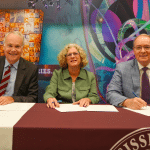President Donald Trump is drawing criticism after warning pregnant women not to take Tylenol and suggesting it may cause autism, sparking Mississippi doctors to try to clear the air on the pain reliever.
Earlier this week, Trump repeated unproven claims tying acetaminophen – the generic name for Tylenol – to rising autism rates while also echoing discredited theories about vaccines. Medical groups noted that large-scale studies have not established a link between acetaminophen use in pregnancy and autism.
The resurfacing of an old Tylenol statement on social media has added fuel to the discussion. In 2017, the company’s official X account posted: “We actually don’t recommend using any of our products while pregnant. Thank you for taking the time to voice your concerns today.”
We actually don’t recommend using any of our products while pregnant. Thank you for taking the time to voice your concerns today.
— TYLENOL® (@tylenol) March 7, 2017
Despite public concern, physicians in Mississippi said the best available research does not support Trump’s claims.
A Hattiesburg-based physician, Dr. Jennifer Bryan, said she understands why parents want answers.
“As a physician, I share parents’ concerns about autism and want better answers,” Bryan said. “There were some older, limited, and inconsistent studies that raised questions, but the most recent, rigorous research, including very large studies, has not found a link. Tylenol remains considered safe in pregnancy.”
Bryan, who is the former president of the Mississippi State Medical Association, added that avoiding acetaminophen while pregnant carries its own risks.
“Untreated fever is tied to serious birth defects, and acetaminophen remains our safest, and for all practical purposes, only option for treating fever in pregnant women,” she said. “The best step for expectant mothers is to talk directly with their physician, who knows their health and their baby’s health best.”

Another former president of the Mississippi State Medical Association, Dr. Geri Weiland said autism is far more complex than a single risk factor like acetaminophen and echoed much of what Bryan said.
“Autism is likely to be a multifactorial disease, and Tylenol will not be the only factor,” the Vicksburg-based pediatrician said. “We don’t know for sure, and more studies need to be done before we can make a definitive diagnosis with that.”
She said shifts in diagnosis over time partly explain rising rates. According to the U.S. Centers for Disease Control and Prevention, the prevalence of autism spectrum disorder among 8-year-olds reached 1 in 31, or 3.2%, in 2022 across 16 monitoring sites. That rate represents an increase from 1 in 36 in 2020. In Mississippi, the state’s Autism Advisory Committee noted that in 2012, the incidence rate was about 1 in 88, and by 2024, the committee cited a rate of 1 in 361 in public reporting.
“In my experience in the past 40 years, autism was not diagnosed as much,” Weiland said. “Children I now see with low-functioning autism were often diagnosed with mental retardation four decades ago.”

Weiland mentioned that advanced technology, like the National Institutes of Health’s Autism Data Science Initiative, a major research initiative using large-scale data to study the factors behind the causes and growing prevalence of autism spectrum disorder, continues to play a part in the research.
“We’ve been very successful with survival in very low birthweight babies,” Weiland said. “Many of those patients have learning disabilities and some autistic issues.”
Weiland cautioned against placing blame on pregnant women when roughly two-thirds of women in the U.S. use Tylenol based on widespread recommendation from doctors, according to the CDC.
“I think it’s not fair to moms who took acetaminophen for them to feel guilty that their child may have gotten autism from that,” she said.
Bryan said she hopes the renewed attention on autism will ultimately produce benefits.
“My hope is that by leveraging this spotlight on autism, we will look back on this time as one that sparked real innovation in understanding and meaningfully addressing such a complex condition — and that by working together, we helped improve the lives of a lot of families,” she said.
State Health Officer Dr. Dan Edney cited an FDA notice to physicians sent out after Trump’s announcement. In the notice, the FDA said evidence suggested that acetaminophen use during pregnancy may be linked to higher risks of conditions such as autism but no causal relationship was proven and advised clinicians to minimize routine use while beginning the process of updating safety labels to reflect any potential risks.
“There are studies that point to an association between acetaminophen and autism spectrum disorder, which is a whole complicated issue in and of itself. But there’s no evidence of causation, and those are two very different things,” Edney said while adding that its important pregnant women discuss the use of any medication with their doctor: “The studies are all with chronic, higher dose use in pregnancy, rather than the occasional sporadic use, which most women would use.”
The Associated Press contributed to this report.








